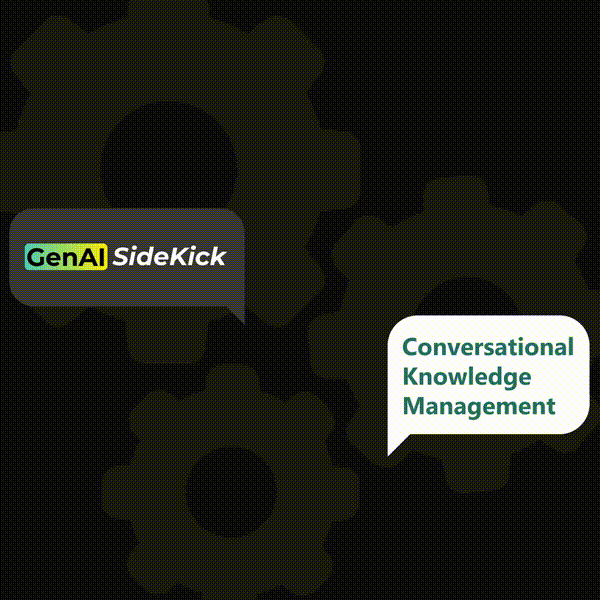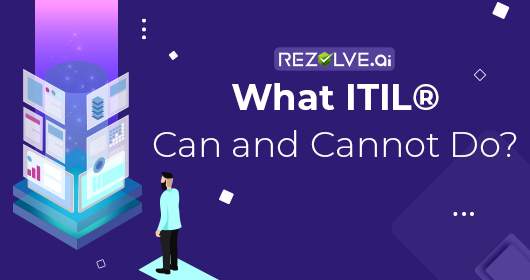Heading
Rezolve.ai's Smart HR Predictions and Trends for 2024
2024 is a year where the world of employee and people management is set to change significantly. The reason? The digital transformation that's happening in companies all over the globe.
Generative AI, a subset of AI, is becoming more and more common, and it's causing some big challenges. We have yet to determine precisely how GenAI will change how we work, but one thing is certain - HR professionals will spend a lot of time figuring it out this year.
So, let's look at Rezolve.ai's smart predictions for 2024. In this blog, we will also look at the big trends that will change HR in 2024 and beyond. It's a time of big changes in the way we work and do business, and these predictions will help us understand what's coming.
Let's get started!
Why is Staying Updated on HR Trends Necessary?
Staying updated on HR trends is crucial for organizations in today's rapidly evolving business landscape. Just like fashion trends come and go, so do HR trends, and neglecting them can leave your company feeling outdated and struggling to attract and retain top talent. Here's why staying up-to-date on HR trends is so important:
1. Attract and retain top talent
In a competitive job market, being aware of HR trends allows organizations to align their offerings with the preferences of top talent. This includes not only competitive compensation but also contemporary work arrangements, wellness programs, and professional development opportunities that can make an organization more likable to potential employees.
2. Improve employee engagement and productivity
Implementing the latest trends in HR practices, such as continuous feedback mechanisms, personalized development plans, and recognition programs, can contribute to a positive work environment. Employees who are engaged are more productive, innovative, and committed to the organization.
3. Enhance your employer's brand
A positive employer brand is essential for attracting and retaining new talent. Being at the forefront of HR trends enables organizations to exhibit their commitment to employee well-being, diversity, and innovation. This positive image can resonate with current and potential employees, reinforcing the company's reputation as an employer of choice.
4. Reduce legal risks
Employment laws are subject to change, and non-compliance can lead to legal issues. Staying updated on HR trends ensures that HR professionals are aware of changes in regulations and can adapt policies and practices accordingly. This proactive approach helps mitigate legal risks, protecting the organization from lawsuits and penalties.
5. Improve decision-making
Data-driven decision-making is essential for effective HR management. Organizations can leverage data and research to make informed decisions by staying informed about HR trends. This includes adopting analytics tools for workforce planning, performance analysis, and other strategic HR initiatives. Informed decisions contribute to the overall success and sustainability of the organization.
Smart HR Predictions And Trends For 2024

Here are some smart HR predictions and trends for 2024:
Trend 1: Talent War Heats Up
The intensifying global talent war places a premium on attracting and retaining skilled professionals. To address the widening skills gap, companies will implement multifaceted strategies. Employer branding will become a focal point, emphasizing a compelling workplace culture and value proposition. Flexible work arrangements- like remote and hybrid options, will be crucial in accommodating diverse preferences. Upskilling and reskilling programs will not only bridge existing skill gaps but also instill a culture of continuous learning, ensuring that employees remain adaptable in the face of evolving job requirements.
Trend 2: Generative AI Takes Center Stage
Generative AI is poised to transform HR processes, automating routine tasks and enabling more strategic talent management. Recruitment processes will leverage Generative AI for unbiased candidate screening, and onboarding experiences will be personalized through GenAI-driven insights.
Investing in Generative AI solutions, such as Rezolve.ai's HR service desk, has the potential to improve employee engagement and productivity inside a business greatly. By providing quick and easy access to HR help, GenAI-enabled helpdesks enable employees to quickly address their questions and issues, establishing a pleasant and responsive workplace culture.
Incorporating automation and self-service capabilities not only streamline HR operations but also increases the efficiency of the HR support team, allowing them to focus on more strategic projects. This technology-driven strategy provides quick and correct responses to employee requests and encourages a smooth and user-friendly experience, resulting in higher overall workplace happiness and performance.
AI analytics will inform performance management, allowing HR to identify patterns that contribute to employee success. As AI becomes more ingrained, ethical considerations, transparency, and adherence to fair practices will be paramount to maintaining trust and mitigating biases.
Trend 3: Rise of the Hybrid Workplace
Hybrid work models, a byproduct of the pandemic, will continue to evolve. HR will focus on creating cohesive strategies for managing distributed teams. This includes fostering virtual collaboration through advanced communication tools, addressing potential disparities in team dynamics, and ensuring that remote and in-office employees experience a seamless integration. Innovative team-building activities and virtual engagement programs will be essential for maintaining a unified corporate culture.
Trend 4: Focus on Employee Well-being & Mental Health
Companies will prioritize mental and emotional health as the understanding of employee well-being expands. HR departments will champion mental health support programs, destigmatize conversations around mental health, and implement strategies for promoting work-life balance. Initiatives such as flexible scheduling, mental health days, and access to counseling services will be integral components of comprehensive well-being programs. Cultivating a workplace culture that prioritizes mental health will boost employee morale and enhance productivity.
Trend 5: Skills-based Hiring Takes Over
The shift towards skills-based hiring signals a departure from traditional hiring models. Resumes and degrees will be supplemented by skills assessments and validated through micro-credentials. HR professionals will be adept at identifying relevant skills and aligning them with organizational needs. This approach fosters a more diverse and adaptable workforce and ensures that companies can quickly respond to changing industry demands.
Trend 6: Continuous Learning & Development
The increasing pace of technological advancements necessitates a continuous learning mindset. HR departments will spearhead efforts to establish a culture of ongoing learning. This involves not only providing access to internal and external training programs but also encouraging employees to personalize their learning paths. By supporting continuous upskilling and reskilling initiatives, HR will contribute to a workforce that remains agile in the face of technological disruptions.
Trend 7: Data-driven Decision Making
HR's reliance on data analytics for decision-making will deepen, with a focus on extracting actionable insights from workforce data. Predictive analytics will inform recruitment strategies, identify patterns in employee engagement, and guide talent development initiatives. HR leaders will invest in advanced analytics tools and training to interpret data effectively, ensuring that decisions align with organizational objectives and contribute to sustained success.
Trend 8: Emphasis on Diversity & Inclusion
The emphasis on diversity and inclusion will expand beyond rhetoric to comprehensive action plans. HR will implement inclusive hiring practices, including diverse interview panels, unbiased recruitment algorithms, and targeted outreach programs. Unconscious bias training will be standard, fostering a workplace culture where every employee feels valued and included. Employee resource groups and mentorship programs will further contribute to creating a diverse and supportive workplace.
Trend 9: Employee Experience Takes Priority
A holistic approach to employee experience will be paramount for HR professionals. Beyond traditional HR functions, HR will actively contribute to creating positive experiences at every stage of the employee lifecycle. This involves refining onboarding processes, implementing continuous feedback mechanisms, and ensuring that performance management systems prioritize employee growth and satisfaction. By championing employee-centric initiatives, HR will enhance retention rates and contribute to a thriving organizational culture.
Trend 10: The Gig Economy Evolves
As the gig economy grows, HR will play a pivotal role in adapting traditional workforce management strategies. Policies will be developed to ensure fair compensation, benefits, and professional development opportunities for gig workers. HR professionals will work closely with legal teams to navigate evolving labor laws and regulations affecting gig workers. Additionally, fostering a sense of belonging and inclusion among gig workers will be a priority to maintain a cohesive organizational culture that accommodates a diverse range of employment arrangements.
Call to Action for HR Professionals
Adaptability is a crucial factor in the success of Human Resources (HR) strategies. The workplace environment is dynamic and constantly changed due to technological advancements, economic fluctuations, regulatory shifts, and societal trends. HR strategies must be flexible and adaptable to navigate these changes effectively. Here are some key reasons why adaptability is important in HR strategies:
1. Focus on Skills and Competencies
Traditional qualifications may not fully capture the skills needed in today's rapidly changing work environment. HR strategies should prioritize identifying and developing relevant skills and competencies, enabling employees to adapt to evolving job requirements.
2. Embrace Hybrid and Flexible Work Models
The workplace is evolving towards hybrid and flexible models. HR strategies should adapt policies to accommodate remote work, flexible schedules, and alternative work arrangements. This flexibility enhances employee satisfaction, work-life balance, and overall productivity.
3. Invest in Continuous Learning and Development Programs
Keeping up with industry trends and pursuing continuous learning are essential for career development. HR should invest in training programs, mentorship initiatives, and learning resources that empower employees to upskill and adapt to changing job demands.
4. Leverage Data Analytics
Data analytics provides valuable insights into workforce trends, employee performance, and the effectiveness of HR initiatives. HR strategies should incorporate data-driven decision-making to identify patterns, forecast future needs, and adapt strategies for optimal organizational performance.
5. Communicate openly and receive feedback
Open communication is essential for understanding employee needs and concerns. HR should foster a culture where employees feel comfortable sharing feedback and ideas. This enables HR to adopt policies based on real-time insights, fostering a positive and inclusive workplace culture.
6. Empower Employees to Take Ownership
Empowering employees to take ownership of their work encourages a sense of responsibility and accountability. HR strategies should promote a leadership style that values employee autonomy, allowing quicker adaptation to challenges and changes in the work environment.
7. Promote Experimentation and Innovation
HR practices should not be static; experimentation and innovation are key. Encouraging HR teams to test new approaches, technologies, and methodologies fosters adaptability. As a result of this experimentation, better HR strategies and practices can be discovered.
Conclusion
Wrapping up our discussion on Rezolve.ai's smart HR predictions and trends for 2024, it's clear that the future of HR is both exciting and challenging. The digital transformation and the rise of Generative AI are set to bring about significant changes in the way we work and do business. While there are still many unknowns, one thing is certain - HR professionals will play a crucial role in navigating these changes. Here's to a year of discovery, adaptation, and growth in the HR landscape. Stay tuned to Rezolve.ai for more insights and updates on the world of HR.
Upgrade Your HR Support with Rezolve.ai's GenAI-enabled HR Service Desk! Book a Demo Now
FAQs
1. What should HR focus on in 2024?
In 2024, HR should prioritize employee well-being, fostering diversity and inclusion, and embracing technology for efficient talent management.
2. What is the future of HR in the next 5 years?
The future of HR involves advanced data analytics, personalized employee experiences, and an increased focus on remote work, adapting to evolving workplace dynamics.
3. What is the talent management strategy in 2024?
Talent management in 2024 involves agile strategies, skill-based assessments, and continuous learning initiatives to meet the demands of a rapidly changing business landscape.
4. Can AI replace HR?
While AI can enhance HR processes, it can't fully replace the human touch in areas like empathy, complex decision-making, and interpersonal relations.
5. How is AI used in HR?
AI in HR streamlines recruitment automates routine tasks, and provides data-driven insights for better decision-making, transforming HR into a strategic partner for business success.


1200x348.png)


530x280%201.png)


.png)